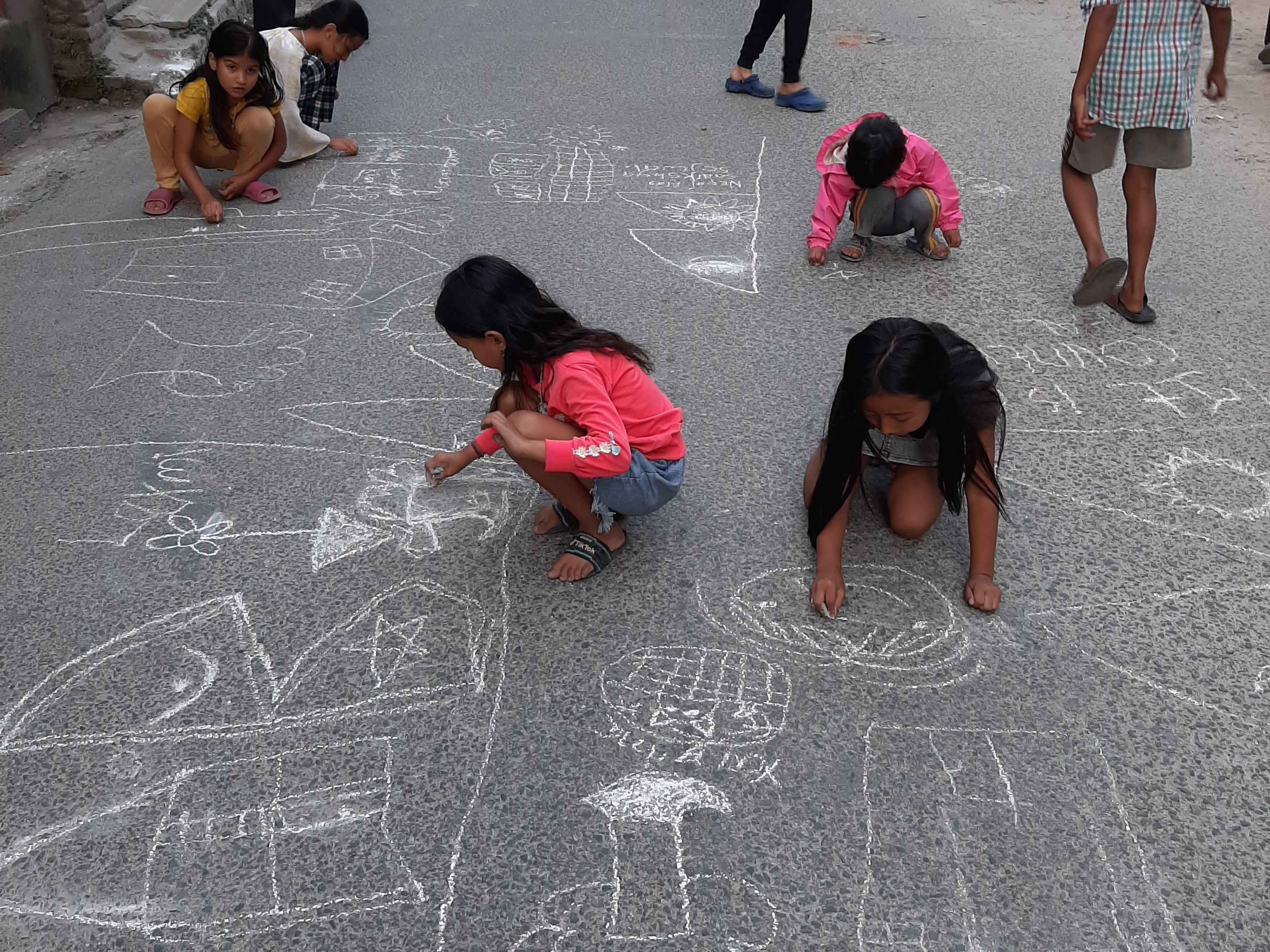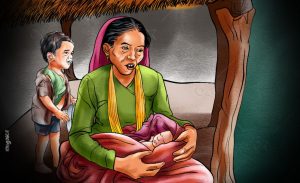
Welcoming a new life into the world is the moment parents wait for. Motherhood gives meaning to females, and they dream of holding a baby after months of carrying them inside their body and hours of labour. But, when the dream comes true, rather than a sense of overwhelming happiness and fulfilment during the postpartum period, some women experience a different reality of postpartum depression.
Dr Sneha Agrawal Chaudhary is a psychologist who earned her master’s degree in applied psychology from Delhi University. During her studies, she learned about the importance of mental health and postpartum depression. And since 2012, Chaudhary has been working at the Norvic International Hospital. She also has a team to manage her social media page, Mindful Transformation, to spread awareness and provide support about several mental health issues, including postpartum depression.

Chaudhary talks to Onlinekhabar about postpartum depression, its symptoms and how it is misconceived and suggests ways to overcome the status.
Excerpts:
What is postpartum depression? How common is it among new mothers in Nepal?
Postpartum depression is a mental health issue that affects new mothers after childbirth. It is characterised as feelings of sadness, anxiety, and exhaustion that can make it difficult for the mothers as they invest their time to care for their baby and her new life.
Some 13 to 15 per cent of women in the world experience postpartum depression while 14.7 per cent of women experience postpartum depression in Nepal, according to a study released on April 2022.
What are the common symptoms of postpartum depression to look out for?

Hormonal changes are often the first thing women experience. New mothers can feel discomfort and require time to adjust for the first two weeks of delivery, it is called postpartum blues. This period is normal.
But when new mothers see the symptoms beyond the two weeks like sleep disturbance, appetite changes and fatigue, body aches, headaches, weight gain or loss… They can also see a loss of interest and motivation where even taking a shower is a great challenge. Then that is postpartum depression. They must seek professional help if symptoms persist.
The symptoms can be mild or severe where some abandon a lot of their daily life duties, and some do not like the baby or have emotional detachment and feel guilty about it later. They may have severe mood swings or feelings of sadness, anxiety, or extreme irritability. In rare cases, some see serious mental health conditions or psychosis and have suicidal thoughts or thoughts of harming their baby or endangering others.
It is important to note that the duration of these conditions can vary greatly where some women may experience symptoms for only up to two weeks while others may struggle with (severe) postpartum depression for a year or more. Also having just one symptom is not conclusive enough to draw that conclusion. We have to look out for at least four or more symptoms to come to that conclusion.
What are the misconceptions or lesser-known facts about postpartum depression in Nepal and beyond?

People assume that postpartum depression can affect only new mothers, but new fathers can also experience some symptoms. They are also less likely to identify and report them. However, the new life of fatherhood will have some impact on fathers like mothers. Some might even feel that traditional parenting might have been easier whereas, with the new co-parenting and hands-on approaches, parenting for fathers can be more stressful too which impacts their mental state.
Couples can also exhibit symptoms during their pregnancy that indicate their experience later. External factors like financial and emotional obligations can be challenging for new parents, especially for working parents. Working mothers often also see the pressure to resume their jobs after giving birth, and the pressure to prioritise families and babies over careers also can prolong the conditions. Other external or unprecedented events like Covid also might add to the burnt they might feel.
And like general depression, genetics can play a role in postpartum depression too. But there are other factors like a drop in thyroid levels or hormones that contribute to the condition. Yet it is not a guarantee that a person will experience postpartum depression, but they can be significant risk factors.
What is the available treatment for postpartum depression in Nepal? Can it be avoided?

When it comes to treatment, there are several options available. For those who are experiencing severe symptoms, medication may be necessary to manage the condition and prevent suicidal tendencies. In addition to medication, psychotherapy can also be an effective treatment option, allowing individuals to explore and address underlying issues that may contribute to their depression.
Preventive measures include taking time for self-care, such as yoga and light walks, taking breaks to rest and eat well, setting realistic goals, and changing the environment. Staying updated and aware can help cope with the trouble and deal with the stigma. Gynaecologists can also play a key role in this during pre- and postnatal visits.
It is important for mothers to be comfortable asking for help from their families, friends, and neighbours, and to join new mother support groups to feel like they are not alone in their experiences. By taking care of themselves and seeking support, new mothers can reduce their risk of developing postpartum depression.
How do you suggest new mothers get help?

Some women can cope quickly and recover rather naturally without the need for professional help while others may require treatment such as therapy or medication to manage their symptoms. Ultimately, every woman’s experience with postpartum mental health is unique.
But if they need help, struggling mothers should not hesitate to seek support as they tend to often dismiss their symptoms. And it should start by recognising their problem. Denial can lead to delays in seeking treatment, which can be detrimental to both the mother’s and child’s health.
Even for nuclear families, new parents can reach out to their immediate or extended families, friends and trusted individuals to get help for a smooth transition into motherhood. And single mothers may face additional challenges when it comes to managing postpartum depression. But single or not new mothers need to build a strong support network of friends, family members, and professionals or even other new mothers who can provide emotional and practical support during this time.
Ultimately, it is important for expectant parents to be aware of the potential risks and to seek support and treatment if they begin to experience symptoms. By being proactive about mental health during pregnancy, parents can better prepare themselves for the challenges of the postpartum period and ensure that they and their children receive the care and support they need. Families can be a big help in this process.
What can be the role of partners and families in their treatment?

While breastfeeding is something where the mother’s role cannot or is advised not to be replaced, partners and family members can help the mother cope with other changes and demands of motherhood. Taking on responsibilities like bottle-feeding, changing diapers, cleaning, and cooking can be a huge relief for new mothers who may be overwhelmed by the demands of caring for a baby. By dividing these tasks, partners and families can help ease the burden and promote a sense of teamwork and collaboration.
Partners can help by being present and attentive, or by identifying and addressing any symptoms that may be present. By actively listening to what she is saying, partners and families can detect any signs of frustration, stress, or anxiety as well as concerns about her career, difficulty sleeping, or other emotional issues that may arise. By working together, partners can create a supportive environment that promotes healing and recovery.
Ultimately, the joy of welcoming a new life into the world is one that the whole family can enjoy, and supporting the new mother is an essential part of this experience.
Where does Nepal stand in terms of talking about it?

After the Covid pandemic, awareness about mental health issues increased but postpartum depression remains a topic that is often overlooked and heavily stigmatised. There is some discussion on it online, but there are no discussions at the government level.
Recently, I have noticed that more parents who are planning to have a baby are seeking out mental health professionals, in addition to their gynaecologists, to prepare themselves for the emotional challenges that come with pregnancy and childbirth. But that is few and far between. However, while some gynaecologists may refer them to professionals after counselling, it does not always transfer them adhering to the suggestions, due to financial barriers or stigma.
To address this issue, it may be helpful for Nepal to adopt protocols from other countries that have successfully implemented comprehensive postpartum depression care programmes. Working together with healthcare providers and policymakers can help ensure that all new mothers have access to the care they need.


























